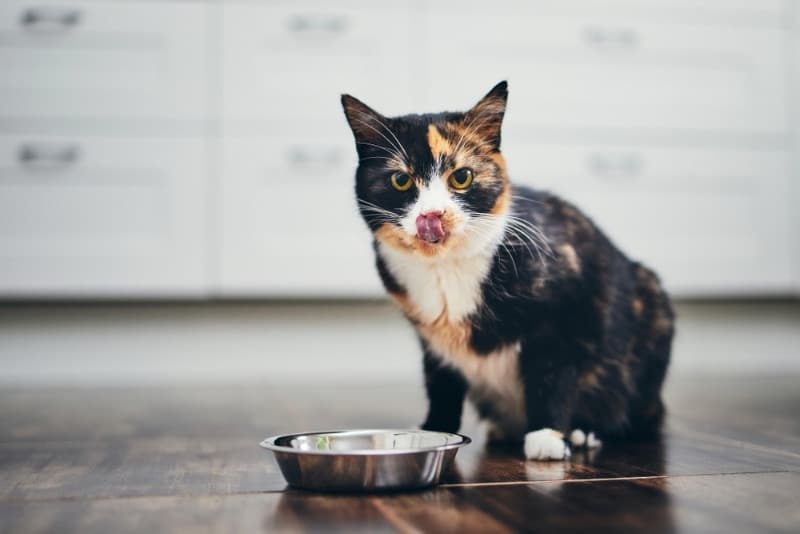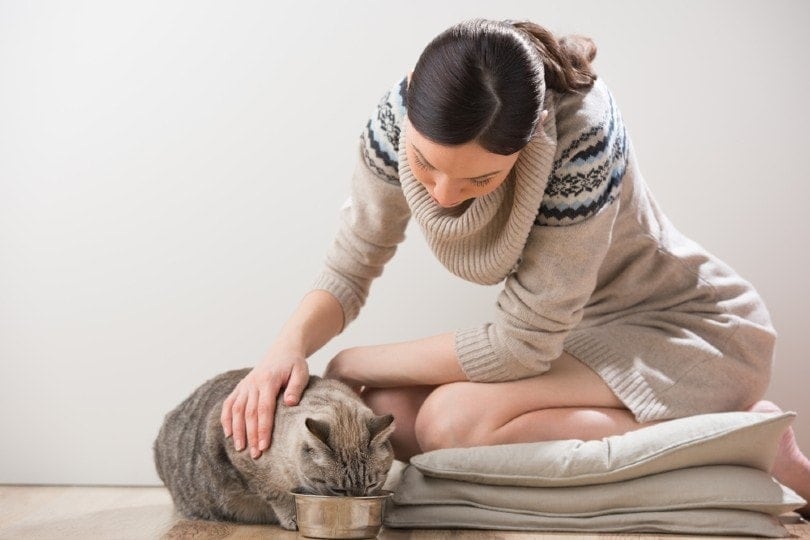Cats have many quirky habits that make them beloved pets around the world. You are probably already aware that cats can be finicky about feeding time, whether it’s over the type of food or who watches them eat.
Some felines prefer eating while being watched, and it can be a habit they picked up as a kitten or learned over time. It is usually not a cause for concern unless your cat refuses to eat if you are not watching them.
So, why do cats want us to watch them eat and what does it mean? This article has the answers for you.
Why Do Some Cats Want Us to Watch Them Eat?
There are several reasons why your cat wants you to watch them eat. Your cat could be comfortable enough to let you watch them eat because they trust you and feel safe. It could also be a habit your cat never outgrew as a kitten or adjusted to in a previous home or shelter environment.
Kittens usually eat with their siblings and feel connected and safe together. If they cannot adjust to eating alone when removed from their siblings, they might rely on their owners for a similar connection. This could also apply to cats in shelters who eat surrounded by other felines and sometimes people.
Some experts suggest that it could be an instinct domesticated cats get from their wild ancestors. Your cat might feel vulnerable eating alone and feel safer eating in your presence. Furthermore, anxious or stressed cats may crave companionship during feeding times, and you are their best source of it. It is not necessarily caused by a medical condition, but sometimes factors like stress could result in it.
Most cats have no problem letting their owners watch them eat, and some cats even prefer it. Regardless of the reason behind it, this type of behavior has a name: affection eating.

Affection Eating in Cats
“Affection eating” is the term used to describe cats that require companionship or affection during feeding time. This could manifest as a cat that enjoys having you present while they eat and might be a bit hesitant to eat if you are not around. They could feel more comfortable eating when you are watching or petting them.
Keep in mind that not every cat will be an affection eater, as some cats enjoy being accompanied during feeding time more than others. It’s important to respect your cat’s personal space while they eat and not make feeding time stressful for them. You want to avoid petting your cat while they are eating if they seem uncomfortable. Some cats prefer their space while eating, but others don’t mind the affection.
It will be clear what boundaries your cat has when eating, as most signs of stress or enjoyment of your affection are visible through their body language. A cat that is meowing for you to watch or stroke them while they eat is inviting you to be more affectionate toward them. A cat that is moving away from your touch or appearing irritable should rather be left alone while they eat.
When Is Affection Eating Concerning for Cats?
Most mild forms of affection eating are not a concern for cats. It’s not very problematic for a cat to enjoy having you around while they eat if it benefits from your companionship. However, affection eating can become concerning if your cat becomes dependent on your affection to eat and won’t eat unless you are there.
Furthermore, cats might become affectionate eaters because of negative emotions or situations, such as stressors in the environment. These stressors could include moving to a new home, introducing new pets, or noisy construction, amongst others. Your cat could be too stressed to eat alone and will refuse food until you are with them. Some cats can benefit from your encouragement during feeding times, while others could be developing a habit that is difficult to break.
It’s important to discuss any changes in your cats’ eating habits with a veterinarian. It is concerning for a cat to refuse food unless you are giving them affection. There is likely an underlying issue that needs to be addressed, whether it is caused by stress or simply a habit your cat developed that needs to be addressed.

How Can You Help a Cat Overcome Affection Eating?
Let’s take a look below at ways you could help your cat overcome affection eating.
- Place your cat’s food bowl in a quiet area near other pets or people. Some cats do not enjoy eating in an undisturbed area where they feel alone. They might prefer to be around other people or pets when they eat so they feel safer and less vulnerable.
- Try to be less focused on them while they eat. It’s okay to want to be near your cat as they eat, but try doing activities around the house where your cat can still see you. Your cat will benefit from your presence but will start adjusting to not having your complete focus.
- Dedicate some of your time to giving your cat attention during activities that do not involve food. This could include playtime, grooming, or a cuddle session on the couch. This allows your cat to receive the necessary social time and affection from you without having to beg for it over food.
- Address any stressors in the environment that could cause your cat to need reassurance during feeding time. Their affection eating habits might start to change once they are no longer feeling stressed.

Conclusion
Affection eating applies to cats that enjoy your affection while eating. They will be content with being watched or petted. In some cases, affection eating can become concerning if your cat refuses to eat without you being there. Cats can become affection eaters for various reasons, such as an old habit or for safety purposes. However, some cats need affection while they eat because they are stressed and want your reassurance.
Related Reads:
- Ask a Vet: Would You Recommend Wet Food or Dry Food for Cats?
- Human Foods for Cats? What Cats Can & Can’t Eat
- Tips for Bringing a Shy Cat Out of Their Shell
Featured Image Credit: Milles Studio, Shutterstock










